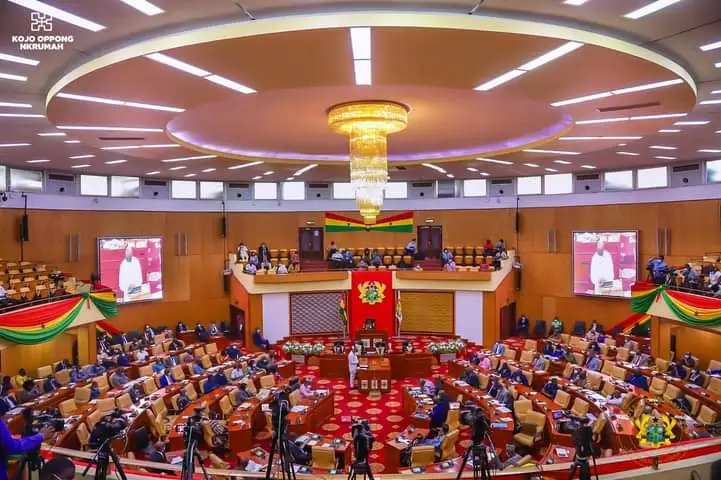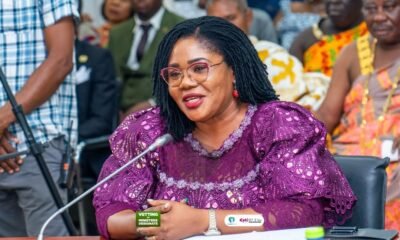Bussiness
Post-budget debate begins today, Tuesday, November 29 in Parliament

The Debate on the Budget Statement and Economic Policy of the Government of Ghana for the year ending December 31 2023, begins today, Tuesday, November 29 2022, in Parliament.
Mr Frank Annoh Dompreh, Majority Chief Whip, said the Business Committee had proposed 20 minutes time allocation to the Seconder and Ranking Member of the Finance Committee.
Presenting the Business Statement of the House for the week ending Friday, November 25, Mr Annoh Dompreh, MP, Nsawam Adoagyiri on the ticket of the New Patriotic Party, noted that while other Committee Chairpersons and Ranking Members would be allocated 15 minutes, all other members would have ten minutes to debate the budget.
He, therefore, urged MPs to have a well-researched and informed debate on the Economic Policy of the Government for the year 2023.
“Mr Speaker, the Business Committee proposes that the debate for each day be structured along specific sectors that is governance, including security and public safety, finance and economy generally, energy and other infrastructural sectors, the social sector, local governance as well as youth, sports, tourism and the cultural sectors,” he said.
The recommendation, Mr Annoh Dompreh explained, would ensure coherence, comprehensiveness and logical flow of the debate.
Accordingly, the Business Committee proposed as follows; Tuesday, November 29, Finance, Agriculture, Trade and Industry.
He said on Wednesday, November 30, the Committee proposed the debate focused on Communications, Energy, Roads, Works and Housing, Sanitation and Environment while Thursday, December 1 would be for Education, Health, Employment, Youth and Sports, Tourism, Culture and Chieftaincy.
“Mr Speaker, as recommended during the presentation of the Business Statement last week, the Business Committee once again recommends that the Hosue commences sitting each day at 10: 00 am prompt and also have extended sittings to ensure the debate on the Budget Statement and Economic Policy of the Government concludes on Tuesday 6th December 2022.
“To that effect, Monday 5th December 2022, the House will sit to debate these sectors under the budget, Governance (including Local Government, Judiciary, Interior, EC, NCCE, CHRAJ) and conclude the debate on Tuesday 6th December 2022,” he said.
Mr Annoh Dompreh entreated all Committees to endeavour to commence the consideration of the Budget Estimates of the various Ministries, Departments and Agencies (MDAs) by Wednesday, December 7 2022.
He further urged all committees to expeditiously work on the Budget Estimates of the various MDAs for the consideration of the Hosue due to the limited time available to Parliament before the Yuletide.
“The foregoing recommendation is expected to enable the expeditious consideration of the Budget Estimates and the passing of the Appropriation Bill, 2022 before the House adjourning sine die in the fourth week of December 2022,” he said on the floor of Parliament on Friday.
By Article 179 of the 1992 Constitution and section 21 of the Public Financial Management Act, 2016 (Act 921) Mr Ofori-Atta, Minister for Finance on behalf of President Nana Addo Dankwa Akufo-Addo, presented the 2023 Annual Budget Statement and Economic Policy of Government to Parliament on Thursday, November 24.
Among other things, the 2023 Budget focused on Government’s strategies to restore and stabilise the macro economy, build resilience and promote inclusive growth and value creation.
It also featured updates on Ghana’s engagement with the International Monetary Fund (IMF) for an IMF-supported Programme; year-to-date macro-fiscal performance of the economy; the YouStart initiative under the Ghana CARES Programme; climate action strategies; fiscal measures and debt management strategies to ensure fiscal and debt sustainability and promote growth.
Meanwhile, a two-day post-budget workshop has ended in the Volta Region ahead of the debate.
The annual Post-Budget Workshop had the primary goal of equipping MPs and Senior Officers of the Parliamentary Service with the skills to scrutinise the Budget Statement and Economic Policy of the Executive arm of government for the 2023 fiscal year. -GNA
Bussiness
Ghana’s GDP shows economy is fast recovering despite DDEP – Finance Ministry

Ghana’s Gross Domestic Product (GDP) indicates a rapid economic recovery despite global challenges and ongoing debt restructuring, according to the Ministry of Finance (MoF).
The Ministry in a statement today indicated that latest data from the Ghana Statistical Service (GSS), cumulative economic growth for the second quarter (Q2) of 2024 reached 6.9%, a notable increase from the 4.7% recorded in the first quarter of 2024.
The MoF statement further noted that, “The economy’s robust recovery is in response to the macroeconomic stability and growth interventions that government is pursuing under our IMF-supported Post Covid-19 Programme for Economic Growth (PC-PEG).”
According to them, the overall real GDP growth for the first half of 2024 rebounded strongly, with year-on-year GDP growth averaging 5.8% for the period, significantly higher than the 2.9% recorded in the same period in 2023.
By Edem Mensah-Tsotorme
Read full statement below


Bussiness
Facebook, Youtube, online trading companies must be taxed – Deputy Finance Minister

The Deputy Finance Minister Dr Alex Ampaabeng, has proposed that online trading companies should be taxed to bolster the economy.
He noted that these companies, both local and international, generate significant revenue from their Ghanaian clients, which underscores the necessity for taxation.
In an interview with Bernard Avle on Channel One TV’s The Point of View, Dr Ampaabeng pointed out various potential revenue sources for Ghana, including online businesses and content creation companies.
He questioned why other national companies operating in Ghana are taxed, but social media platforms like Youtube and Facebook, which run numerous advertisements, are not included in the Ghanaian tax system.
According to him, these social media companies earn profits from the advertisements they display, and online trading companies also generate income from the sale of their products and services.
He mentioned online trading companies such as Jiji, Jumia, and Tonaton, which he believes surpass all physical marketplaces in Ghana in size.
According to him, “I can’t think of a country which has not gotten a digital service tax system of some sort, so Ghana is long overdue. Just to make an example so that people will appreciate where I’m coming from. Go to Youtube and play a video, within one or two minutes, you are going to watch about two, or three adverts.”
“What it tells you is that Facebook or Youtube is making profits right here in Ghana. Go to your Facebook account, and you are going to see a number of adverts on your right, left. What it is telling you is that Facebook is making profits right here in Ghana and not being taxed. Meanwhile, there are companies operating in Ghana, for jurisdiction reasons, of course, that are being taxed,” he said.
The Deputy Minister added that “So then, it comes to the question of the application of our tax laws. Revenues generated in Ghana are subject to taxes. We have Facebook, TikTok and all those players, these are digital platform owners.”
He stressed, “Then we have the digital or market players, here we are talking about individuals who are using the digital platforms. We have Jiji, Jumia, Tonaton, these combined, are bigger than all physical marketplaces in Ghana. And it tells you the volume of transactions, that are going on there.”
He expressed his hope that individuals earning online profits from Ghanaian residents would be taxed.
“There are conversations ongoing, I wouldn’t want to pre-empt anything, maybe in the future, it might not be anytime soon, what I would like to see, is a Ghana where people who are earning all forms of profits in the country are subject to taxes. People who are trading online to Ghanaian residents, people who are generating revenue from Ghana are allowed to pay taxes,” he noted.
Additionally, he proposed a collaboration with the government to curb cybercrime by registering and verifying these online trading companies.
“We can have a system where the government engages these operators, so individuals will submit their Ghana Card and are registered and verified,”he concluded.
Source: Citinewsroom.com







